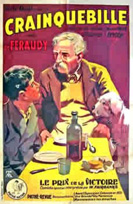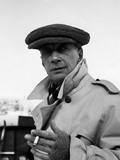Crainquebille

- Production : France, 1922
- Length : 75 min at 18 frames/second
- Orchestration : 1st violin, 2nd violin, Viola, Cello, Double Bass, Clarinet, Bassoon, French Horn, Piano, Accordeon
Scenario :
Crainquebille is a pushcart peddler in Paris, a lowly and yet lovable character without a touch of maudlin sentiment. He has been selling his vegetables in the same neighborhood for 40 years and has built up quite a clientele among the housewives. One day, through no fault of his own, he becomes involved in an altercation with a self-important gendarme. Before knowing what it is all about, he is under arrest for insulting an officer of the law.
There follows a mockery of a trial. Crainquebille is sentenced to two weeks in jail and a fine of 50 francs. He serves his term without grumbling, rather enjoying the novelty of a soft bed and running hot and cold water. His only worry is what has happened to his pushcart. When released, he goes joyously back to work, only to find he is now considered a jailbird, and has lost all his former customers. Discouraged and disheartened, he begins to drink heavily, is evicted from his garret and becomes a human wreck. Just as he is about to end it all in the Seine, a newsboy whom he had befriended, saves his life.
The entire film is art with a capital A. If the various “better film” associations fail to include this one in their selected lists for the year, there is no such thing as art in American filmdom. (Variety Review 13 Dec 1923)
The Director :
Jacques Feyder
 Jacques Feyder : A French film-maker of Belgian origins, born under the name of Jacques Frédérix in 1885. His family intended him to follow a military career, but he changed his name and chose first, the theater, and then the cinema in 1912. He debuted as a director with Gaumont in 1915. L’Atlantide brought him international fame in 1921. Thus started a cosmopolitan career with many ups and downs and films made in the studios of Paris, Vienna, Berlin, Munich, Los Angeles and London.
Jacques Feyder : A French film-maker of Belgian origins, born under the name of Jacques Frédérix in 1885. His family intended him to follow a military career, but he changed his name and chose first, the theater, and then the cinema in 1912. He debuted as a director with Gaumont in 1915. L’Atlantide brought him international fame in 1921. Thus started a cosmopolitan career with many ups and downs and films made in the studios of Paris, Vienna, Berlin, Munich, Los Angeles and London.
Returning to Paris from a disappointing stay in Hollywood, he found new inspiration with a series of films starring his talented wife, Françoise Rosay : Le Grand jeu (1934), Pension Mimosas and the famous Carnival in Flanders (1935). He died in Switzerland in 1948.
The Composer :
Antonio Coppola
 During the last 25 years, Antonio Coppola has written numerous scores for silent movies. Today, he is considered to be one of the most knowledgeable and experienced musicians in this very specialised field.
During the last 25 years, Antonio Coppola has written numerous scores for silent movies. Today, he is considered to be one of the most knowledgeable and experienced musicians in this very specialised field.
Born in Rome in 1956, he studied piano, composition and conducting at the Santa Cecilia Conservatory. In 1973, he started work as a pianist for theatrical productions and contemporary dance. When in 1975 he accompanied a silent movie on the piano for the first time, he immediately decided to cease his other musical activities and devote himself to this. Since 1975, he has been invited to play at hundreds of silent movie projections in hundreds of cinemas throughout Italy, France, Germany, the USA, Brazil, Argentina, Spain, Greece and England.
He has given courses on the musical accompaniment of silent movies in numerous universities in Europe and throughout the world.
 English
English Français
Français










